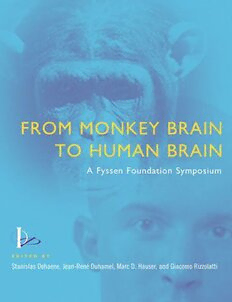
From Monkey Brain to Human Brain: A Fyssen Foundation Symposium (Bradford Books) PDF
418 Pages·2005·3.147 MB·English
Most books are stored in the elastic cloud where traffic is expensive. For this reason, we have a limit on daily download.
Preview From Monkey Brain to Human Brain: A Fyssen Foundation Symposium (Bradford Books)
Description:
The extraordinary overlap between human and chimpanzee genomes does not result in an equal overlap between human and chimpanzee thoughts, sensations, perceptions, and emotions; there are considerable similarities but also considerable differences between human and nonhuman primate brains. From Monkey Brain to Human Brain uses the latest findings in cognitive psychology, comparative biology, and neuroscience to look at the complex patterns of convergence and divergence in primate cortical organization and function.Several chapters examine the use of modern technologies to study primate brains, analyzing the potentials and the limitations of neuroimaging as well as genetic and computational approaches. These methods, which can be applied identically across different species of primates, help to highlight the paradox of nonlinear primate evolution -- the fact that major changes in brain size and functional complexity resulted from small changes in the genome. Other chapters identify plausible analogs or homologs in nonhuman primates for such human cognitive functions as arithmetic, reading, theory of mind, and altruism; examine the role of parietofrontal circuits in the production and comprehension of actions; analyze the contributions of the prefrontal and cingulate cortices to cognitive control; and explore to what extent visual recognition and visual attention are related in humans and other primates.The Fyssen Foundation is dedicated to encouraging scientific inquiry into the cognitive mechanisms that underlie animal and human behavior and has long sponsored symposia on topics of central importance to the cognitive sciences.
See more
The list of books you might like
Most books are stored in the elastic cloud where traffic is expensive. For this reason, we have a limit on daily download.
